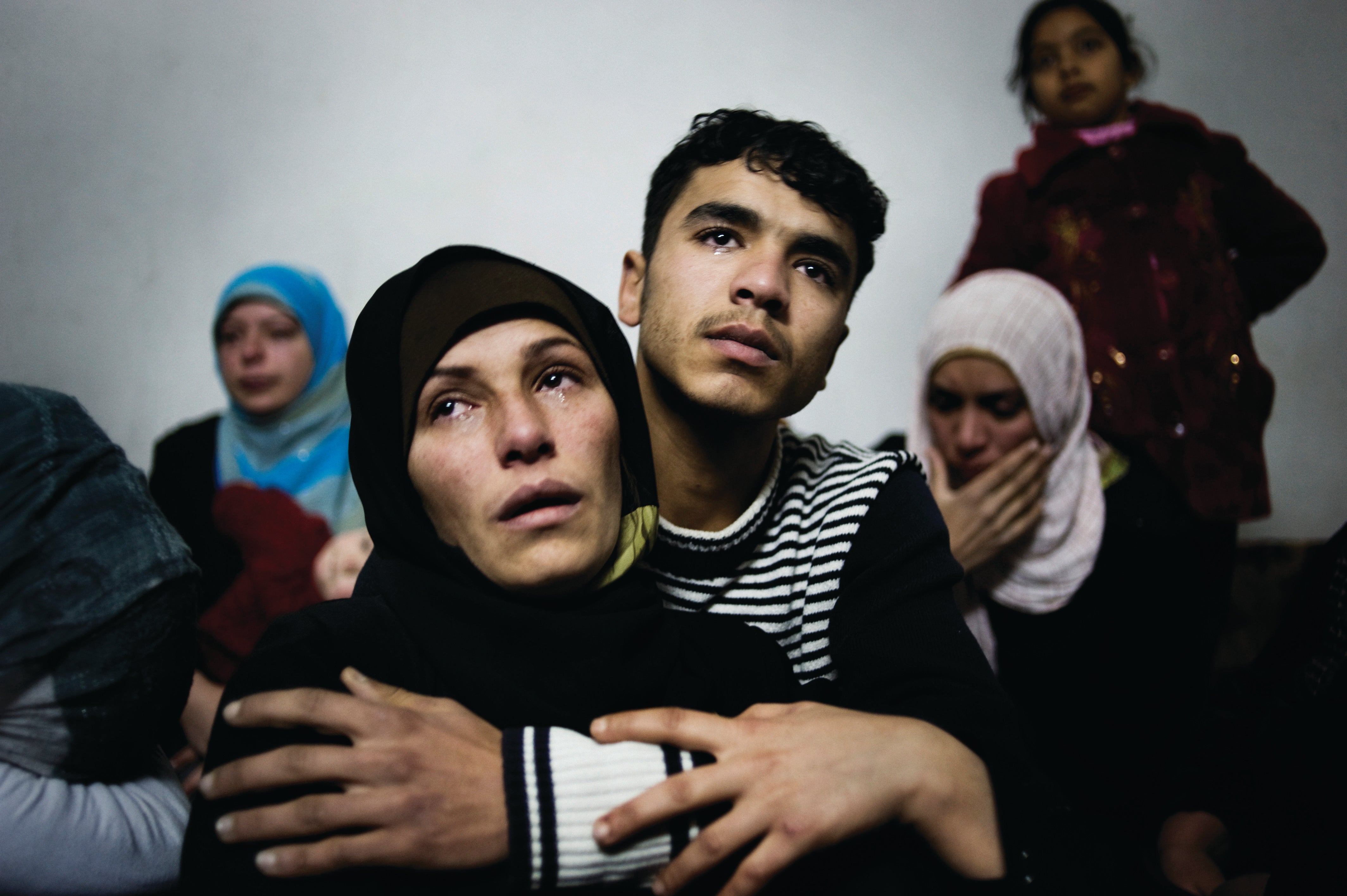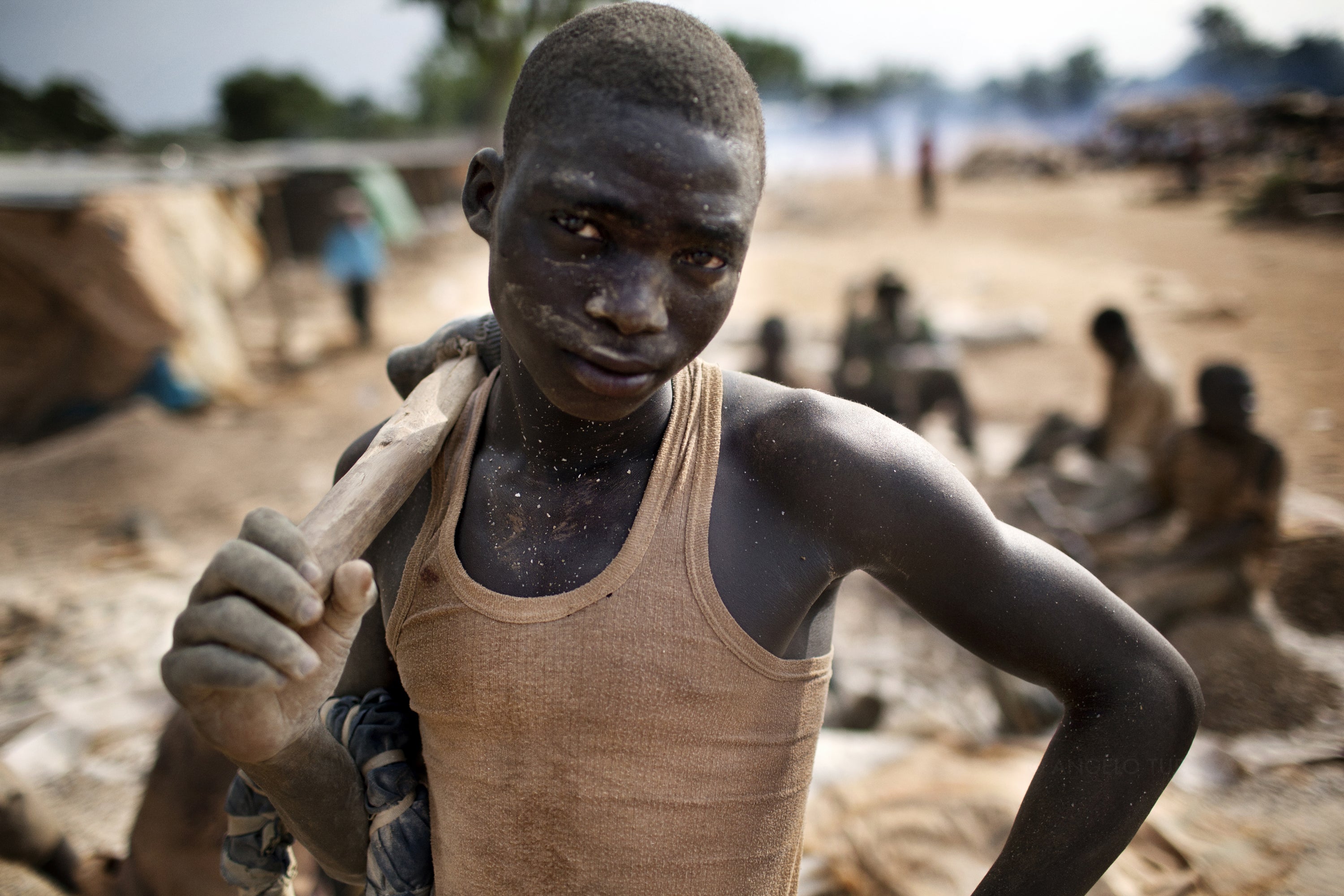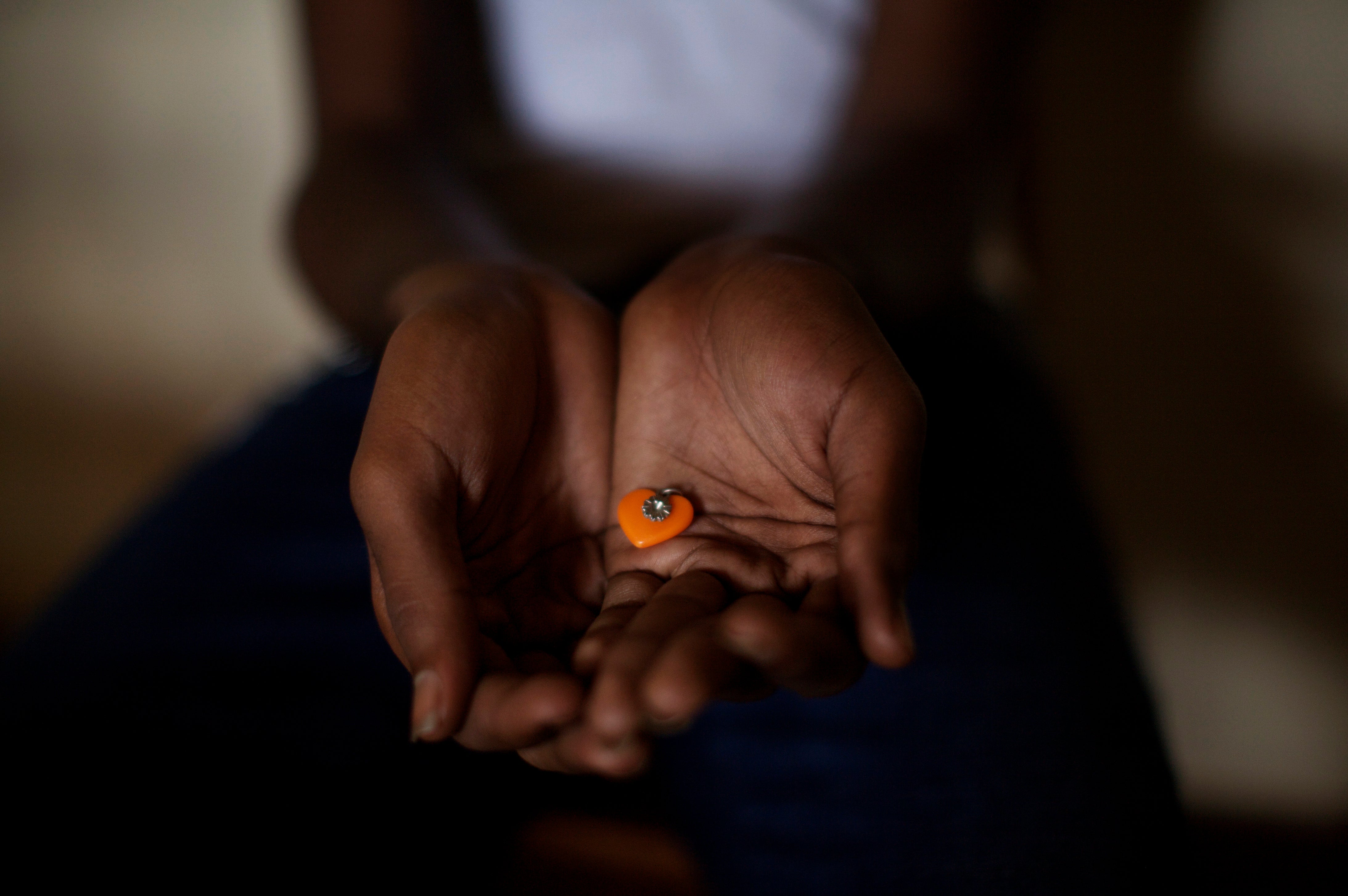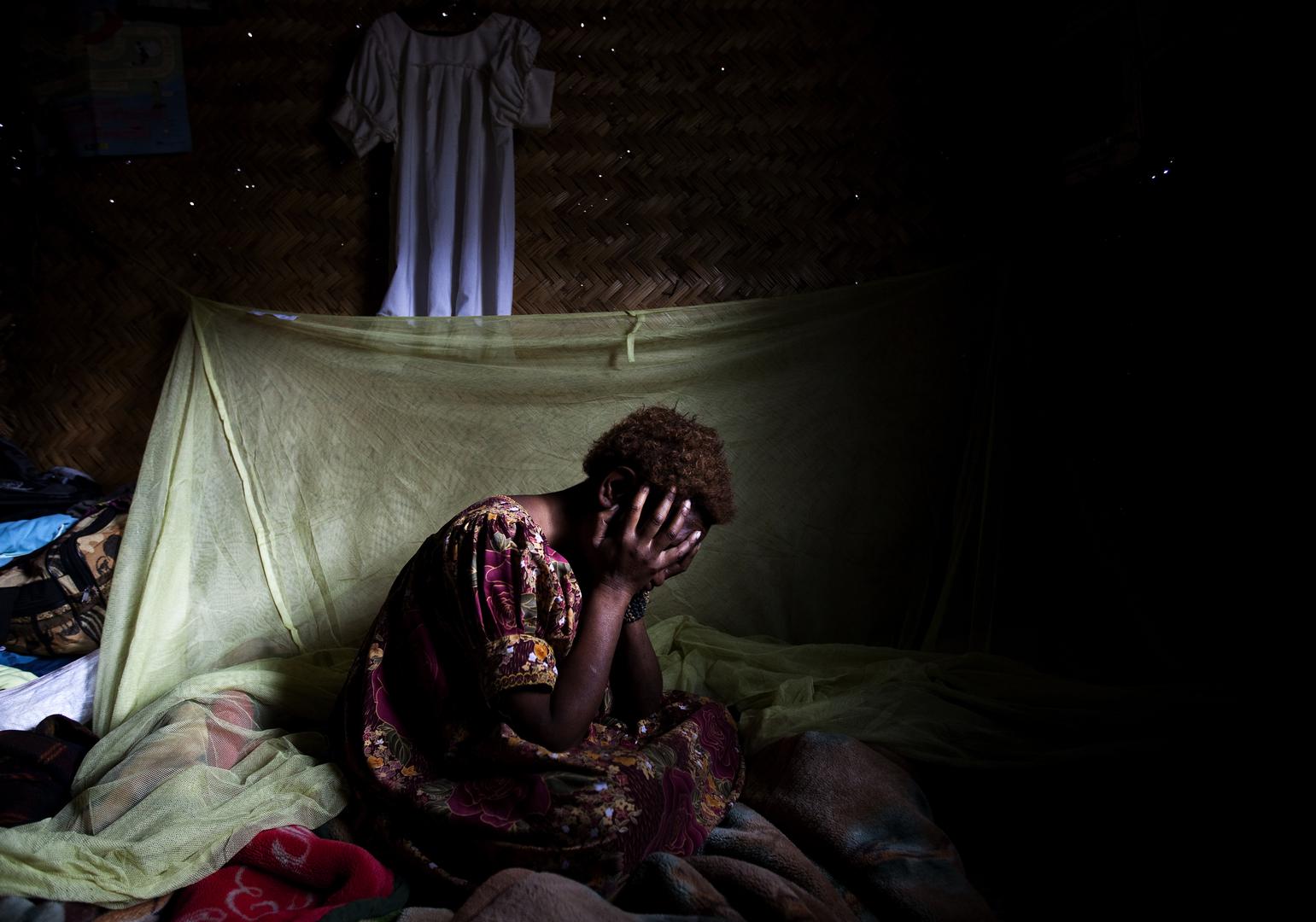Syria’s uprising turned increasingly bloody in 2012 as the government’s crackdown on anti-government protests developed into an entrenched armed conflict. Government forces and pro-government militia known as shabeeha continue to torture detainees and commit extrajudicial killings in areas under their control. Some opposition forces have also carried out serious abuses like kidnapping, torture, and extrajudicial executions. According to opposition sources, 34,346 civilians had been killed in the conflict at this writing. The spread and intensification of fighting have led to a dire humanitarian situation with hundreds of thousands displaced internally or seeking refuge in neighboring countries.
Violations during Large-Scale Military Operations
Security forces conducted several large-scale military operations in restive towns and cities across the country, resulting in mass killings. In February, government forces killed hundreds of civilians in the Baba Amr neighborhood of Homs, western Syria, as a result of indiscriminate shelling and sniper fire. The government used similar tactics in cities across the country. Syrian forces and pro-government shabeeha militias also committed summary and extrajudicial executions in the governorates of Idlib, Homs, Aleppo, and in the suburbs of the capital, Damascus, following ground operations to reconquer terrain lost to the opposition. On May 25, at least 108 residents of Houla near Homs were also killed, most shot at close range. According to survivors and local activists, it was pro-government armed men who were responsible for the executions. In late August, residents from the Damascus suburbs of Daraya and Moadamiya also described finding hundreds of bodies following ground operations there. Some of the victims appeared to have been executed by government forces.
In August, the government began relying more extensively on air power, often firing indiscriminately at heavily populated areas. In an attack on August 15, a fighter jet dropped two bombs on Azaz, in Aleppo governorate, killing more than 40 civilians including many women and children. In August, Syrian government forces also dropped bombs and fired artillery at or near at least 10 bakeries in Aleppo province, willfully killing and maiming scores of civilians who were waiting for bread.
Arbitrary Arrests, Enforced Disappearances, Torture, and Deaths in Custody
Security forces subjected tens of thousands of people to arbitrary arrests,
unlawful detentions, enforced disappearances, ill-treatment, and torture using an extensive network of detention facilities throughout Syria. Many detainees were young men in their 20s or 30s, but children, women, and elderly people were also included.
Those arrested include peaceful protesters and activists involved in organizing, filming, and reporting on protests, as well as journalists, humanitarian assistance providers, and doctors. In some instances activists reported that security forces detained their family members, including children, to pressure them to turn themselves in.
A large number of political activists remain in incommunicado detention. Some have been held for over a year, while others have faced trial for exercising their rights. In one case on February 16, Air Force intelligence forces raided the Syrian Center for Media and Freedom of Expression (SCM) and arrested 16 people, including seven women. In September, seven members of the SCM staff were charged and convicted of publishing banned documents with the intent to change the basic principles of the constitution. Five of the men arrested—including Mazen Darwish, the group’s president—remain in incommunicado detention.
According to released detainees and defectors, the methods of torture included prolonged beatings, often with batons and wires, holding the detainees in painful stress positions for prolonged periods of time, electrocution, sexual assault and humiliation, the pulling of fingernails, and mock execution. The interrogators and guards also subjected detainees to various forms of humiliating treatment, such as making them kiss their shoes and declare that President Bashar al-Assad was their god. All detainees described appalling detention conditions, with overcrowded cells in which detainees could only sleep in turns.
Several former detainees said they had witnessed people dying from torture in detention. At least 865 detainees died in custody in 2012, according to local activists. In cases of custodial death that Human Rights Watch reviewed, the bodies bore unmistakable marks of torture including bruises, cuts, and burns. The authorities provided the families with no information on the circumstances surrounding the deaths. In some cases, families of dead detainees had to sign statements that “armed gangs” had killed their relatives and promise not to hold public funerals as a condition to receiving the bodies.
In the vast majority of detention cases, family members could obtain no information about the fate or whereabouts of the detainees.
Displacement Crisis
Iraq, Jordan, Lebanon, and Turkey have mostly opened their borders to more than 341,000 refugees from neighboring Syria. However, in violation of Syrians’ right to seek asylum, in mid to late August, Iraq and Turkey began to deny tens of thousands access to their territories, either by limiting daily numbers and the profile of those who could cross or by closing border crossings entirely and only sporadically allowing a limited number to cross. Syrians stranded as a result lived in poor conditions and were at risk of air and artillery attacks by government forces. All four countries have denied Syrians secure legal status, and after July, Jordan and the Iraqi central government forced all new arrivals to live in closed camps.
Lebanon deported 14 Syrians in August, four of whom said they feared persecution upon return.
Refugees have also been subject to attack by Syrian government forces as they attempt to flee the country. Refugees described incidents in late May and June in which the Syrian Army opened fire indiscriminately and without warning at civilians trying to flee for Jordan.
Unlawful Use of Weapons and Human Shields
According to witnesses and Syrian de-miners, Syrian forces have placed landmines— including anti-personnel and anti-vehicle mines of Soviet or Russian origin—near the borders with Lebanon and Turkey, resulting in civilian casualties.
Since July, and increasingly since October, Syrian armed forces have used cluster bombs—weapons that are considered inherently indiscriminate when used in populated areas. From October 9 to this writing, Human Rights Watch documented 35 cluster bomb strike sites across Syria in the governorates of Aleppo, Idlib, Deir al-Zor, Homs, Latakia, and Damascus.
Syrian government forces have also endangered local residents by forcing them to march in front of the army during arrest operations, troop movements, and attacks on towns and villages. Witnesses from the towns of al-Janoudyah, Kafr Nabl, Kafr Rouma, and Ayn Larouz in Idlib governorate said they saw the army and shabeeha force people to march in front of them during the March offensive to retake control of areas that had fallen into opposition hands.
Sexual Violence
Syrian government forces have used sexual violence to torture men, women, and boys detained during the current conflict. Witnesses and victims also said that soldiers and pro-government armed militias have sexually abused women and girls as young as 12 during home raids and military sweeps of residential areas.
Children’s Rights
Syrian army and security officers have detained children under inhumane conditions and tortured them with impunity during the past year. Government forces have also shot at children in their homes and on the street. Both government and opposition forces have used schools as detention centers or barracks turning them into military targets. Government forces have also used them as sniper posts and arrested and beaten children and teachers in schools.
Armed Opposition Abuses
Armed opposition groups have committed serious human rights abuses including kidnapping, arbitrary detention, ill-treatment, and torture and carried out extrajudicial or summary executions of security force members, government supporters, and people identified as shabeeha.
In one case, two Free Syrian Army (FSA) fighters from the Ansar Mohammed battalion in Latakia said that their battalion executed four people after storming a police station in Haffa in June—two immediately and the others after a trial. In August, six detainees in two opposition-run detention facilities said that armed opposition fighters and officials in charge of detention facilities had tortured and mistreated them.
Key International Actors and Developments
The international community remains deeply divided on Syria. On February 4, the United Nations Security Council considered a resolution that condemned the violence in Syria and called for a political transition. The resolution was the second of three Security Council resolutions in 2011-2012 to be vetoed by Russia and China.
In December 2011, Syria accepted a plan by the League of Arab States (LAS) to end the violence against peaceful protesters, release those detained, and withdraw armed elements from cities and residential areas. The LAS sent monitors in on December 26, but suspended the monitoring mission on January 28 because of the deteriorating security situation.
On February 23, the UN secretary-general appointed Kofi Annan as the joint special envoy of the UN and LAS on Syria. In mid-March, Annan proposed a six-point peace plan to bring about a ceasefire and open political dialogue. In the following weeks, Annan negotiated the peace plan with the Syrian government and announced on April 4 that President Assad had given assurances he would “immediately” start pulling back his forces and complete a military withdrawal from urban areas by April 10. On April 21, the Security Council established a UN supervision mission in Syria (UNSMIS)—with 300 observers—tasked with monitoring the cessation of violence and implementation of Annan’s plan.
Amid ceasefire violations by government and opposition forces, on June 16, the observer’s monitoring activities were suspended because of escalating violence and the unwillingness of the parties to seek a peaceful transition.
The Security Council then voted on a resolution on July 17 that would have threatened non-military sanctions against the government for non-compliance with the six-point plan which China and Russia again both vetoed. In August, Annan announced his resignation as special envoy and the monitoring mission withdrew. In September, the Algerian diplomat and UN veteran Lakhdar Brahimi took over from Annan as special envoy.
Despite the stalemate in the Security Council, the General Assembly and the Human Rights Council (HRC) did pass a number of strong resolutions on Syria with overwhelming majorities. The HRC extended—until March 2013—and strengthened the international commission of inquiry mandated to investigate violations and, where possible, identify those responsible. There were also repeated calls in support of the HRC referring the situation in Syria to the International Criminal Court (ICC) by member states and by Navi Pillay, the UN high commissioner for human tights.
Efforts were also taken outside of the UN to pursue a negotiated settlement to the conflict and to put additional pressures on the Syrian government including through the establishment of a “Friends of Syria” contact group in February. In June, Annan and several foreign ministers, including the five permanent Security Council members, met to discuss how to end the violence and begin a political process leading to a transition. In November, Brahimi encouraged the Security Council to turn the Geneva agreement into a Security Council resolution.
In November, Syrian opposition factions also created a new umbrella grouping: the National Coalition of Syrian Revolutionary and Opposition Forces. At this writing, the Gulf Cooperation Council and France had recognized the coalition as the legitimate representative of the Syrian people.
In 2012, Canada, the European Union, Switzerland, Turkey, and the United States implemented sanctions against individuals and entities implicated in human rights abuses, including senior officials and the Syrian Central Bank. Imports of Syrian oil and arms sales have also been banned. Nineteen LAS member states pledged to implement sanctions, but the extent to which these have in fact been implemented remains unclear and the LAS itself has not established any effective sanctions monitoring mechanism.
The governments of China, Iran, and Russia continued to support the Syrian government either diplomatically or through financial and military support. According to Syrian opposition activists and media reports, armed opposition groups in Syria also received financial and military support from Qatar, Saudi Arabia, and Turkey. France, the United Kingdom, and the US also pledged non-lethal aid to opposition groups.




